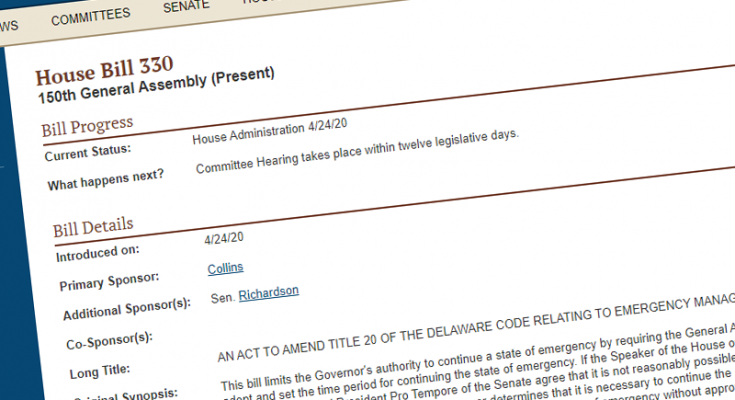Two members of the Delaware State Legislature have introduced a bill that would limit Governor Carney’s emergency powers.
State Representative Richard Collins and Senator Bryant Richardson have submitted House Bill 330 “An Act To Amend Title 20 Of The Delaware Code Relating To Emergency Management” that would give the legislature more say in during an emergency.
The bill, dated Friday, April 24, 2020, if signed into law, would limit the Governor’s authority to continue a state of emergency by requiring the General Assembly to adopt and set the time period for continuing the state of emergency. If the Speaker of the House of Representatives and President Pro Tempore of the Senate agree that it is not reasonably possible for the General Assembly to conduct a meeting and the Governor determines that it is necessary to continue the state of emergency, then and only then may the Governor continue the state of emergency without approval of the General Assembly.
Full Bill
(a) The Governor shall be responsible for addressing the dangers to life, health, environment, property or public peace within the State presented by emergencies or disasters, and to this end shall have general direction and control of DEMA and shall be responsible for carrying out this chapter. In the event of an emergency or disaster beyond local control, the Governor may assume direct operational control over all or any part of the emergency management functions within the State.
(b) In performing the duties of the Governor under this chapter, the Governor may issue, amend and rescind all necessary executive orders, emergency orders, proclamations and regulations, which shall have the force and effect of law.
(c) In addition to the powers conferred upon the Governor by this chapter, a state of emergency may be proclaimed by emergency order of the Governor upon a finding that an emergency or disaster has occurred or that such occurrence or threat of that occurrence is imminent. The state of emergency shall continue until the Governor finds that the threat or danger has passed or the emergency or disaster has been dealt with to the extent that conditions necessitating a state of emergency no longer exist and terminates the state of emergency by subsequent order. Except as provided in this subsection, no No state of emergency can continue for more than 30 days without being adopted by an act of the General Assembly. The General Assembly must state in the act when the state of emergency shall terminate renewed by the Governor . If the Speaker of the House of Representatives and the President Pro Tempore of the Senate agree that it is not reasonably possible for the General Assembly to conduct a meeting and the Governor determines that it is necessary for his declared state of emergency to be renewed, then, and only then, may the Governor without approval by the General Assembly renew the state of emergency for additional 30-day periods until such time as the General Assembly can conduct a meeting to act to continue or terminate the state of emergency. All orders issued under this chapter shall indicate the nature of the emergency or disaster, the geographical area or areas threatened, and the conditions which have brought the emergency or disaster about or which make possible termination of the state of emergency. An order terminating a state of emergency shall describe the reasons for termination, and shall be disseminated as promptly as is practicable by means calculated to bring its contents to the attention of the general public and, unless the circumstances attendant upon the emergency or disaster prevent or impede, shall be promptly logged with DEMA. Emergency action ordered by the Governor in accordance with the Governor’s constitutional and statutory authority shall not be invalidated because of any failure to comply with the technical requirements for the logging or filing of emergency orders.
This is a developing story.

